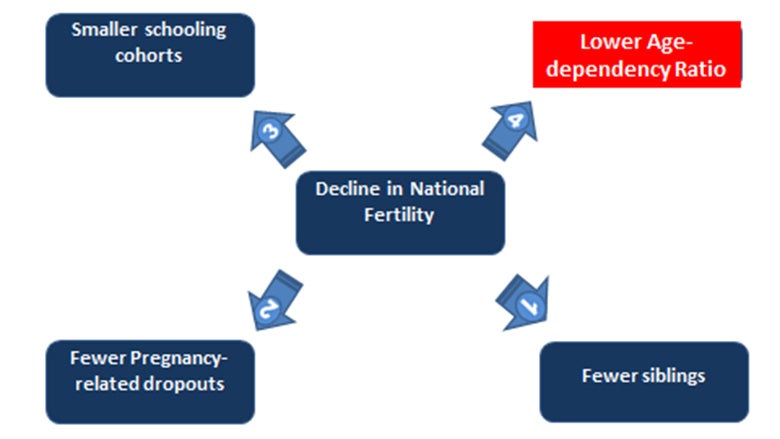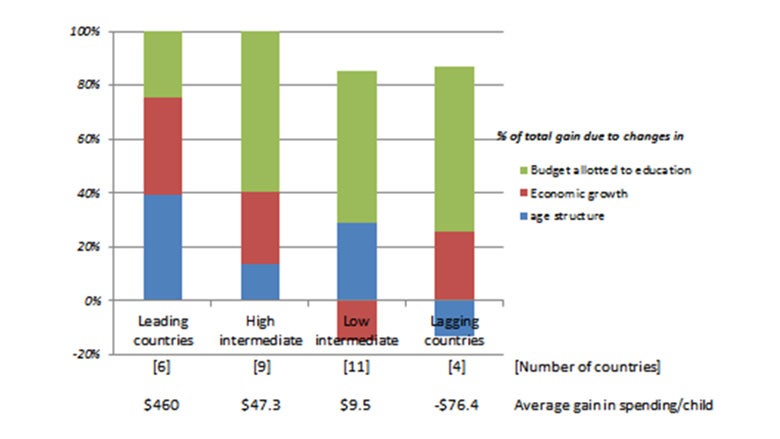Will Africa benefit economically from its current fertility transition? Between 1990 and 2010, Africa’s birth rate fell from 6.2 to 4.9 births per woman. Such a decline was expected to enhance the region’s schooling and development prospects, by creating a historical opportunity for a ‘demographic dividend.’ In theory, dividends result from a temporary reduction in age-dependency ratios as birth rates fall. In practice however, dividends and the conditions under which they emerge are hard to pin down.
The views among scholars are split. For the optimist, the pro-arguments are compelling. Declines in fertility can enhance schooling via several mechanisms that include reductions in (1) the incidence of pregnancy-related dropouts, (2) schooling cohort sizes, (3) age-dependency, and (4) sibling-ship size (Figure 1). The optimist might be further heartened by results from studies that show inverse correlations between fertility and schooling, or by the historical experience of Asia and Latin America that reportedly accrued a schooling dividend during their transitions.

For the more circumspect, theory and mere correlation are not enough. Causal evidence is needed, but this evidence has been in short supply, at least on a scale and at the level of aggregation needed to make confident and general claims about this region. In the absence of ideal data, decomposition methods offer a practical approach to study the schooling dividend. This approach focuses on the mechanical gains in public education spending per child associated with change in a country’s age structure. It is practical in a double sense: first, it uses national statistics that are widely available. Second, its calculations are transparent because they build on the simple mathematical relationship linking public education spending per child (r), national income (G), the share of income allocated to education ( k), and the school age population (n).
This approach was used in a recent World Bank study to estimate the gains in public education spending per pupil (r) registered between 1990 and 2010 in several African countries. Its main findings are as follows:
- On the positive side, the study found evidence of an emerging schooling dividend in the region. For SSA as a whole, average spending (r) increased from $96 to $198. The gains were largest for countries at the vanguard of Africa’s fertility transitions. Thus Southern Africa (excluding Zimbabwe) registered an average jump of 75% in r values, with 26% to 70% of these gains stemming from reductions in age-dependency. Since fertility transitions might additionally affect schooling through the other channels in Figure 1, the total schooling dividend is expected to be larger than estimated in this study.
- On the more cautious side, the study made four observations:
- First, although age dependency was an important factor, economic growth and budget commitments mattered as well. Countries making the largest gains in r did so with a balanced mix of reduced age dependency, economic growth and public commitment to education.
- Second, the gains in r were varied (Figure 2). Indeed, they were selective in ways that reinforce schooling inequality between countries. Similar inequalities might also be emerging within countries, in light of large and growing inequalities in birth rates within countries, and depending on trends in the cost of secondary schooling.
- Third, the decomposition approach focuses on gains in per capita schooling inputs rather than actual schooling outcomes. Improving inputs alone does not guarantee better outcomes, and the extent to which inputs translate into improved outcomes varies across countries.
- Fourth and finally, future dividends are not automatic, especially in countries where transitions have stalled in recent years. Future dividends will require swift, steady, and broad-based declines in fertility, as well as continued incentives to invest in schooling.

Related: Africa’s Demographic Transition: Dividend or Disaster
- Optimism about Africa’s demographic dividend
- 7 Facts about Population in Sub-Saharan Africa
- Will Africa get a schooling dividend?
- Is Africa Aging?


Join the Conversation